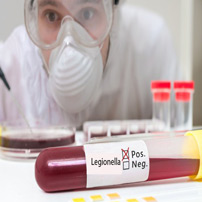Hospital Water
July 5, 2017 The media has recently reported that federal health officials warned nursing homes and hospitals that they must be more vigilant about protecting patients from Legionnaires’ Disease by maintaining an uncontaminated water supply. Legionnaires’ Disease is a type of pneumonia that can be fatal. It is caused by bacteria known as Legionella. This bacterium can be naturally found in fresh water, but also grows in water storage tanks, bathing areas, and pipes that are not properly serviced or maintained and is usually spread by breathing in the mist that contains the Legionella bacteria.
The media has recently reported that federal health officials warned nursing homes and hospitals that they must be more vigilant about protecting patients from Legionnaires’ Disease by maintaining an uncontaminated water supply. Legionnaires’ Disease is a type of pneumonia that can be fatal. It is caused by bacteria known as Legionella. This bacterium can be naturally found in fresh water, but also grows in water storage tanks, bathing areas, and pipes that are not properly serviced or maintained and is usually spread by breathing in the mist that contains the Legionella bacteria.
The elderly and those with a weakened immune system are particularly at risk of contracting this fatal illness. Other risk factors include a history of smoking or chronic lung disease, leading to about ten percent of those infected suffering fatalities.
Signs and symptoms of Legionnaires’ Disease include cough, shortness of breath, high fever, muscle pain, headaches, nausea, vomiting, and diarrhea. Symptoms typically begin two to ten days after being exposed, sometimes making it difficult to identify the source of the contamination.
How to Prevent Legionnaires’ Disease
According to the Centers for Disease Control and Prevention’s Morbidity and Mortality Weekly Report, hospitals and nursing homes reported nearly 3,000 cases of Legionnaires’ Disease. A staggering 66 patients suffered fatalities from the disease in a single year. The Acting Director of the CDC emphasized that this deadly disease is completely preventable.
The CDC has gone on the record stating that hospitals and nursing homes need to work harder to keep the bacteria from getting into places where patients may be exposed. Showers, bathing areas, sinks, and medical equipment that utilizes water are all hosting grounds for Legionnaires’ disease.
Having an effective water-management system helps prevent Legionnaires Disease, according to the CDC. The CDC further reported that in 2015 alone, over 6,000 cases of Legionnaires’ disease were reported. Nearly 3,000 cases occurred in New York City, along with occurrences in twenty different states. About 500 of these cases were suspected to have begun in health care facilities, and 85 cases were definitively initiated in health care facilities or nursing homes.
The CDC was surprised at the number of cases associated with health care facilities, noting that these institutions need to be especially attentive because they service a vulnerable patient population.
Philadelphia Medical Malpractice Lawyers at Galfand Berger Hold Medical Care Providers Responsible for Negligent Treatment
Patients depend on hospitals and nursing homes for care, and have a right to expect competent treatment. Due to the period that can elapse between when a patient contracts Legionnaires’ Disease and showing symptoms, it can be difficult to prove that a healthcare provider is responsible. If you or someone you love has contracted a preventable illness or hospital acquired infection, you need an experienced lawyer in your corner. To learn more about how a medical malpractice lawyer in Philadelphia can help you, call the experienced team of professionals at Galfand Berger today at 800-222-8792 or complete our convenient online contact form. With offices located in Philadelphia, Reading, Lancaster, and Bethlehem, we proudly serve clients throughout Pennsylvania and New Jersey.
 Google Screened
Google Screened
